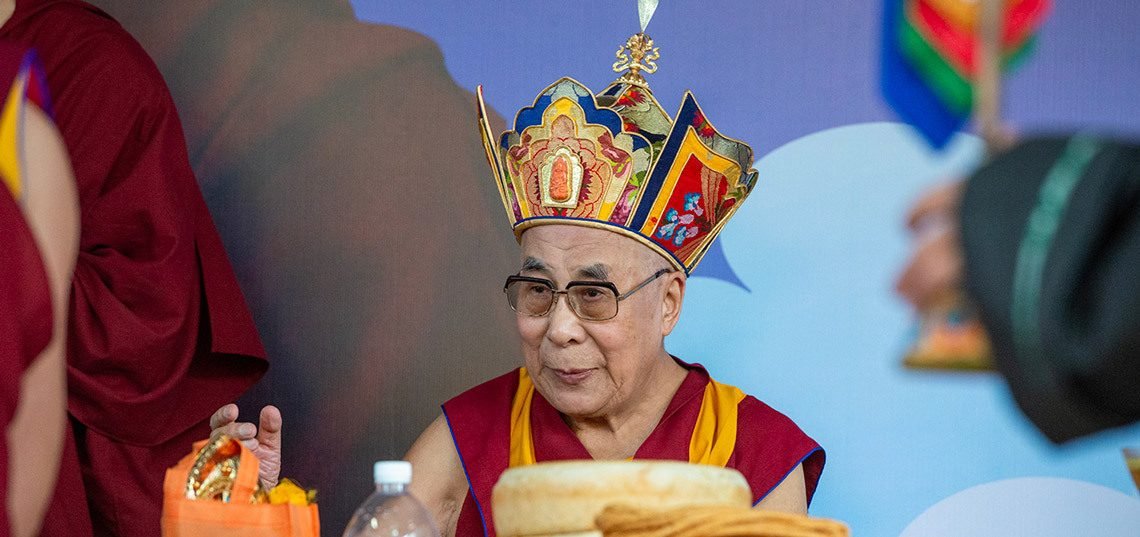While China’s ambassador openly warns against “interference” in the Dalai Lama’s reincarnation, India hides behind constitutional niceties, sending a dangerous message to Tibetans who looked to it for moral leadership.
By Navin Upadhyay
July 6, 2025: At a time when the international community is rallying behind the Dalai Lama’s right to choose his own successor, India, the host of the Tibetan spiritual leader for over six decades, appears to be retreating into ambiguity. The Ministry of External Affairs’ (MEA) recent statement, couched in constitutional language about religious neutrality, does not just fall short — it virtually echoes Beijing’s position. In doing so, India risks undermining its moral credibility and betraying a people who have long looked to it as a sanctuary and beacon of hope.
When history looks back on this moment, it will ask: Did India stand with those whose spiritual freedoms were under siege, or did it retreat behind platitudes while a neighbouring superpower tightened its authoritarian grip?
For over six decades, India has been a sanctuary for His Holiness the 14th Dalai Lama and thousands of Tibetans fleeing Chinese repression. Yet today, when Beijing is aggressively asserting control over the future of Tibetan Buddhism — insisting that even the Dalai Lama’s reincarnation must be approved by the Chinese state — India’s response has been dangerously tepid.
READ: Biren Singh No Longer a VVIP: Escort, Bungalow, CID Units Recalled
In a sharply worded post on X last night, China’s ambassador to India, Xu Feihong, declared that the reincarnation of the Dalai Lama is “entirely an internal affair of China,” warning that “no interference by any external forces will be allowed.” He reiterated the Communist Party’s position that the lineage of the Dalai Lamas evolved “entirely within China’s Tibet region,” and that religious titles are a matter governed by Chinese law.
This belligerent stance came after Union Minister Kiren Rijiju had the courage to state what should have been obvious: that only the Dalai Lama himself has the right to decide on his successor. Rijiju’s words were a rare and welcome assertion of principle — one that resonated with Tibetans and their global supporters. But almost immediately, India’s Ministry of External Affairs (MEA) pulled the rug out from under him.
Just in: ‘No interference by any external forces will be allowed’, Chinese Ambassador Xu Feihong on remarks of ‘Indian officials’ on reincarnation of Dalai Lama pic.twitter.com/VccckZg27U
— Sidhant Sibal (@sidhant) July 6, 2025
In its official statement, the MEA said, “The Government of India does not take any position or speak on matters concerning beliefs and practices of faith and religion.” It further stated, “The Government has always upheld freedom of religion for all in India and will continue to do so.”
On the surface, this appears to be a stance of neutrality. In reality, it amounts to silent complicity.
At a time when the United States, the European Union, and governments across the democratic world have explicitly backed the Dalai Lama’s authority to determine his own spiritual succession, India’s refusal to do the same is baffling. Worse, it sends a signal — to China, to Tibetans, and to the world — that India is unwilling to defend even those it shelters within its borders.
Let’s be clear: this is not merely a “religious” issue. This is a political and moral battle for the survival of a culture and a people. The reincarnation of the Dalai Lama is being weaponized by Beijing to legitimise its occupation of Tibet and to install a puppet spiritual leader who will toe the Communist Party line. Accepting this is tantamount to surrendering centuries of Tibetan religious tradition to a totalitarian regime.
India has long walked a tightrope on the Tibetan issue — hosting the Dalai Lama while avoiding official recognition of the Tibetan government-in-exile. But there comes a point when neutrality becomes untenable. This is that moment.
China’s outrage, expressed through both its foreign ministry and its ambassador, is not just about Rijiju’s comments. It is about enforcing silence and submission. And if India yields now, it sets a precedent that undermines its own sovereignty and soft power.
READ: After China’s Outburst, MEA Distances Itself from Rijiju’s Dalai Lama Succession Remarks
Tibetans have lived peacefully and respectfully in India for generations. The Dalai Lama has been a global ambassador of peace, compassion, and non-violence. His presence has enhanced India’s moral stature in the world. To now look away while Beijing moves to erase his legacy is to betray that trust.
India must decide whether it will continue to walk on eggshells around China or finally assert itself as a principled democracy that stands for freedom — spiritual, cultural, and human.
The world is watching. And so are the millions who believe that faith is not a matter of state decree. India cannot afford to fail them.














